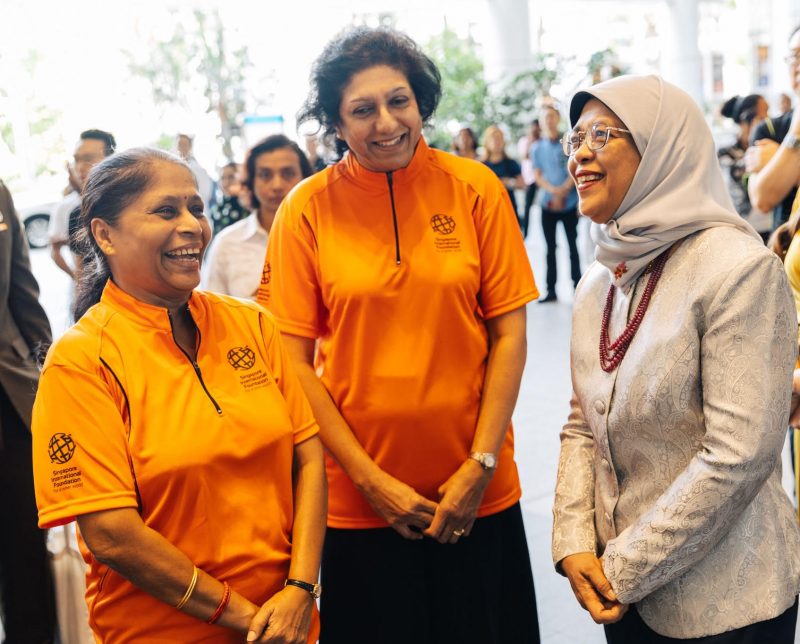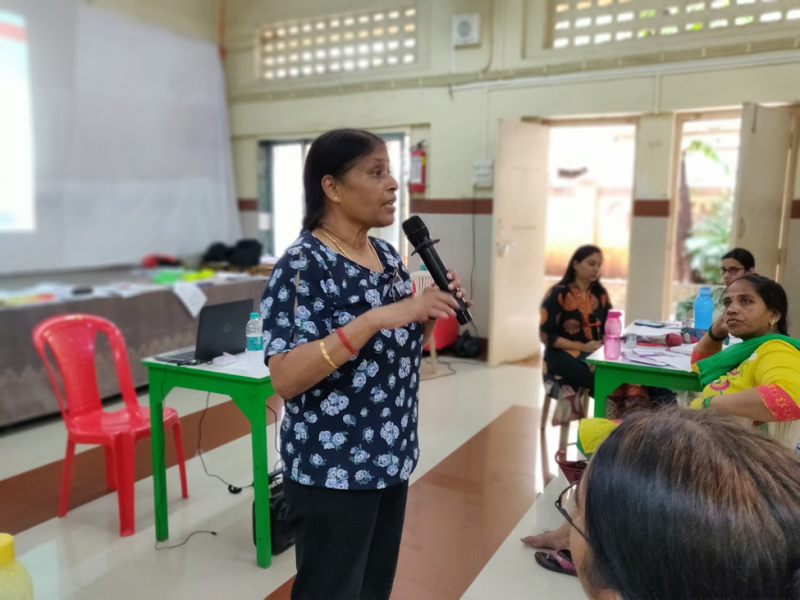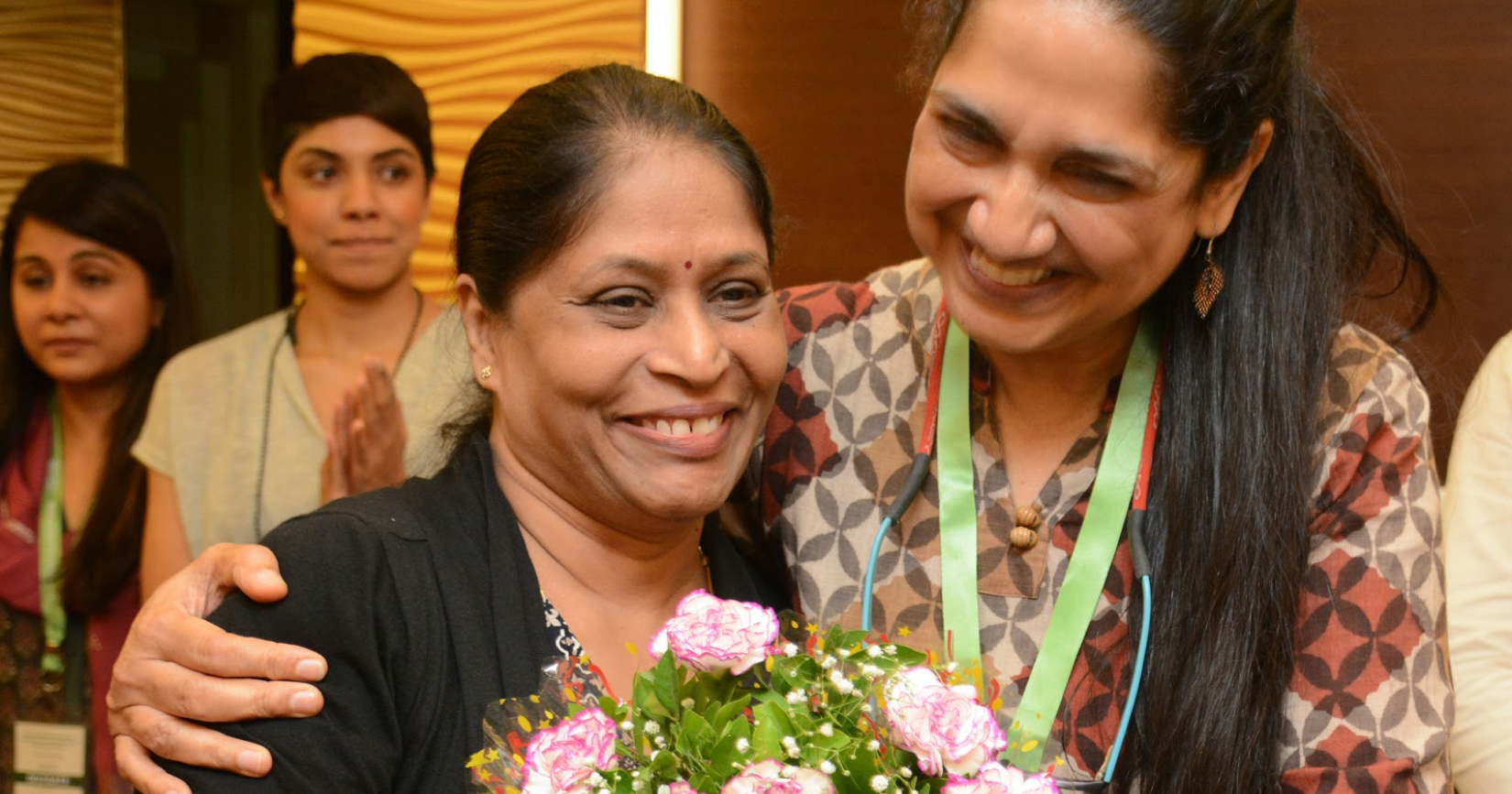It’s hard to argue that 58-year-old Kanniga Devi isn’t one of the most experienced early childhood and special needs educators in Singapore, having worked for nearly 30 years at Presbyterian Community Services, a welfare organisation that provides pre-school education.
As a Capability Support Senior Manager and Special Needs Manager, her skills are in demand not just here, but by teachers from other countries.
With her experience, it may come as a surprise to hear that she almost quit her job on her first day.
“I still remember the first day, I went to the centre and there was this child running towards me,” she recalled. “I was so happy you know, but the next minute, the child just ripped my blouse. I was like oh my God, is this going to be an everyday (occurrence)?”
Kanniga stayed up late that night, wondering if she was even cut out to be an educator.
She even wrote a letter of resignation, which would have ended her career before it had even begun.
But on the very next day, something changed her mind.
“I went to the same centre and the same child came running towards me. But it was so nice, the child just hugged me and said sorry. And that was it lah, my heart melted and I said ‘Ok, maybe God is telling me, this is your call’.”
Kanniga’s passion for her work shines through as she recalls nearly three decades worth of stories. We met on a dreary day in Dhoby Ghaut, with rain hammering on the windows of the offices of the Singapore International Foundation (SIF). But Kanniga’s enthusiasm lights up the room.
She launched into another story, which happened to be about one of her most harrowing experiences as an educator.
One of the teachers she worked with had a student who was not diagnosed, yet it seemed to her that he displayed the characteristics of a child with autism.The teacher, who had the best intentions, thought she recognised the signs and wanted to help out.
“So she took all her notes on autism and gave them to the parents,” said Kanniga, with a rueful chuckle. “She told the parents, ‘I think your child has autism, go and read up.’”
Instead of being grateful, Kanniga recalled quite a scene on the following day.
“I remember the whole family came marching into my office, scolding me. The grandfather was scolding me in Hokkien. I understood some of those words. At the end, the grandfather just spat on me. He was so angry.”
Of course, that was not the right thing to do, but Kanniga felt that the teacher’s approach wasn’t the best either.
The challenge then, she explained, was how to balance the concerns on both sides, and how to tactfully explain to the child’s family of the school’s concerns, and impress on them the importance of assessing the child’s capabilities.
As for the irate grandfather, Kanniga managed to win him over.
“He eventually became one of my best friends too,” she said. “Like Chinese New Year, he will bring crates of oranges. He (even) donated money to build our library.”
 Kanniga (left) and her fellow volunteer, Dr Nirmala Karuppiah share their overseas volunteering experience with President Halimah Yacob, the patron of the SIF.
Kanniga (left) and her fellow volunteer, Dr Nirmala Karuppiah share their overseas volunteering experience with President Halimah Yacob, the patron of the SIF.
Growing attention on early childhood education
This dicey situation took place in the 1980s. In Kanniga’s view, early childhood education and education for children with special needs have gained greater understanding and support over the years.
She pointed out that Prime Minister Lee Hsien Loong devoted part of his National Day Rally speech to the issue of early childhood education. Special needs education also got a boost with the announcement that three new schools will be built in the next few years.
She believes that such public statements and support from the authorities really do make a difference in encouraging others to consider a career in childhood education.
“It’s like an endorsement, you know,” she said, adding that they were “struggling” back then with people of varied quality, but things are better these days with more stringent standards and quality people in the industry.
Kanniga supports investments made in early childhood education. “That’s the most crucial area. That’s where you must pump in more money. Don’t wait until it’s too late.”
But beyond good infrastructure and monetary support, she feels that Singaporeans also need to change their mindset and be more understanding of children with special needs.
Contributing to early childhood education in India
Kanniga’s hard work led to an invite for her to speak at a conference on early childhood education in India, organised by SIF in 2016.
After presenting their methods, an Indian NGO called the Muktangan Education Trust was so impressed with Kanniga and other Singapore educators that they contacted the SIF, hoping to learn more.
This eventually sparked the launch of a three-year Early Childhood Education Curriculum Enhancement and Pedagogy Project in 2017 between the SIF and Muktangan in Mumbai, with Kanniga leading a team of specialist volunteers from Singapore.
“(The early childhood educators in India) are very enthusiastic people. They really want to learn, they really want to do good for the children and their families,” she said.
Kanniga believes that India is facing the same struggles Singapore faced a couple of decades ago, and this means Singaporean educators are able to share their training and resources with their Indian counterparts.
As part of her volunteer efforts with SIF, Kanniga has already visited Mumbai seven times, with plans for more. She said the culture, food and especially the welcoming nature of her hosts made her trips enjoyable.
“They’re so friendly, the people there are very warm,” she recalls. “It’s so wonderful to see the children being children.”
Same same, but different
But she added that it’s not always possible to copy and paste Singaporean methods into an Indian classroom, and expect instant success.
Kanniga cites issues such as the multitude of different languages spoken by children in the rural villages of India, and other differences in mindset and culture.
And while for the most part, Singaporean parents take the importance of early childhood education seriously, it can be difficult to persuade less fortunate Indian parents who may not have enough money for preschool.
“For parents there, they only see going to Grade 1 as education. This is where the teachers (in India) have to go and convince (the) parents of the importance of early childhood, to bring them to the classroom.”
The teachers come up with creative ways to encourage parents to send their children for preschool, such as offering free meals.
And although adjustments have to be made, the Singapore method have seen some successes. The educators in both countries keep in touch by email, with regular progress reports, and they discuss the effectiveness of the programmes when they meet face to face.
Kanniga and her colleagues hope to replicate their success with another of SIF’s Early Childhood Education projects in Jakarta, Indonesia.
 Alongside a team of specialist volunteers from Singapore, Team Leader Kanniga shares her experiences in the ECE sector with her Indian peers.
Alongside a team of specialist volunteers from Singapore, Team Leader Kanniga shares her experiences in the ECE sector with her Indian peers.
Advice for those interested in Early Childhood Education
For anyone interested in making a career out of it, Kanniga has one piece of advice:
“I would say, come, look for yourself and experience it for one day. I can say a lot of things, but there’s nothing like going down and experiencing for yourself what it means, being an early childhood teacher. I would bring them. Come, volunteer. A day in the childcare.”
She credits her executive director, David Lim, for being very supportive of her volunteering efforts. He even gives her unrecorded leave so she can volunteer to help others.
“I have only one word. It’s a blessing. I’m very thankful to Presbyterian Community Services to be able to work and at the same time, to be able to work with SIF.”
And what of the child who nearly made her quit her job on the first day? Kanniga revealed that they still keep in touch till this day.
“You know this same child, later on we became very good friends. Till today, I keep in touch with them. He is actually helping his father in his law firm. There are quite a number of families I do
keep in touch with, the children I actually taught who are now in their 30s.”
If not for that one chance encounter, she may not have changed so many lives for the better.
This sponsored article by SIF made the writer appreciate those who volunteer.
If you like what you read, follow us on Facebook, Instagram, Twitter and Telegram to get the latest updates.
